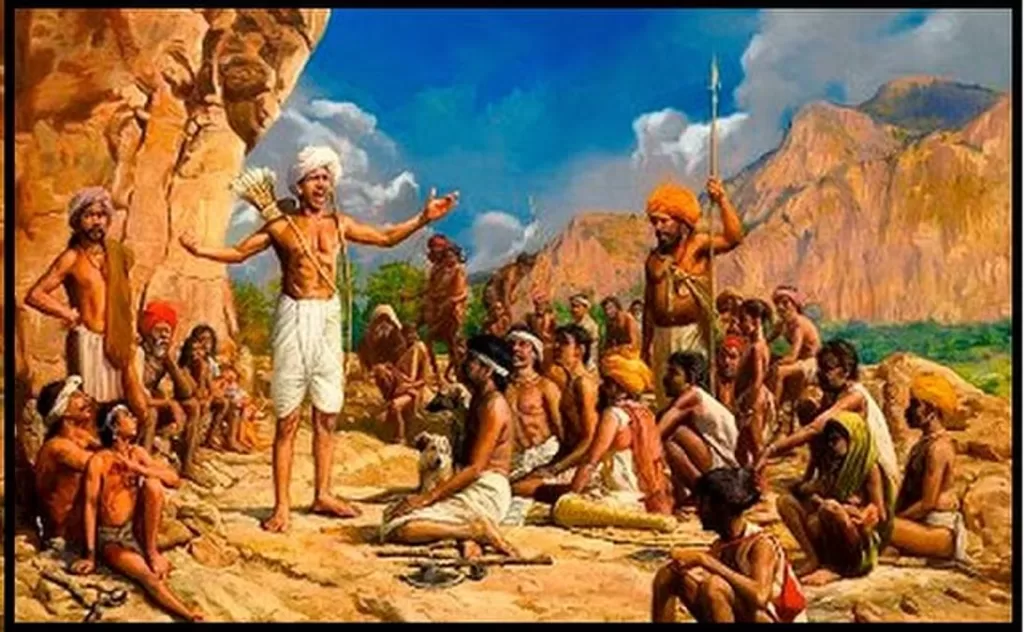Tribal Heroes of Indian Independence
The struggle for India’s independence is often narrated through the lens of prominent leaders such as Mahatma Gandhi, Jawaharlal Nehru, and Subhas Chandra Bose. However, the contributions of tribal leaders and communities are frequently overlooked. These unsung heroes played crucial roles in the fight against British colonial rule, often leading local uprisings, challenging oppressive policies, and fostering a spirit of resistance among their people. Below is an exploration of some of these remarkable individuals who fought valiantly for the rights and freedoms of their communities.

1. Tilka Manjhi (Bihar)
Movement: The Manjhi Revolt of 1785
Start Year: 1785
Tilka Manjhi is often recognized as one of the first tribal leaders to resist British authority. In response to a devastating famine in 1770, he organized the Santhal community into a fighting force, effectively conducting guerrilla warfare against the British and their allies from 1771 to 1784. His fierce commitment to his people’s autonomy made him a symbol of resistance.
2. Budhu Bhagat (Jharkhand)
Movement: Larka Rebellion of 1832
Start Year: 1832
Budhu Bhagat united the tribal population of the Chotanagpur region in a struggle against British colonialism. His guerrilla tactics against the injustices faced by his community, along with his efforts to unify diverse tribal groups, cemented his legacy as a martyr in the freedom struggle.
3. Tirot Sing (Meghalaya)
Movement: The Khasi Rebellion of 1833
Start Year: 1833
Tirot Sing, a Khasi chief, fiercely opposed British attempts to annex the Khasi Hills. His leadership during the Anglo-Khasi War involved strategic guerrilla warfare, showcasing the resolve of tribal leaders to protect their lands and sovereignty.
4. Sidhu and Kanhu Murmu (Jharkhand)
Movement: Santhal Hul of 1855-57
Start Year: 1855
Brothers Sidhu and Kanhu Murmu led the Santhal uprising, which aimed at breaking free from colonial rule. The rebellion not only challenged the British but also attempted to empower the Santhal community, causing significant disruption to colonial authority in the region.
5. Veer Surendra Sai (Odisha)
Movement: 1857 Rebellion of Sambalpur
Start Year: 1857
A tribal leader and prince, Veer Surendra Sai played a pivotal role in the Sambalpur region’s resistance against British colonial forces. His leadership inspired many, and he is remembered for his strategic insights and the ability to mobilize tribal communities against oppression.
6. Birsa Munda (Jharkhand)
Movement: Munda Rebellion, 1899
Start Year: 1899
Birsa Munda emerged as a significant figure in the tribal rebellion against British rule. His vision for a free and just society motivated the Mundas to rise against injustices, and he remains a revered figure among tribal communities in India. Birsa was instrumental in articulating the grievances of his people, and his legacy continues to inspire.
7. Alluri Seetharama Raju (Andhra Pradesh)
Movement: Koya Revolt, 1922-24
Start Year: 1922
Alluri Seetharama Raju is known for leading the Koya revolt against British authorities. He united the Koya tribes against injustices, employing guerrilla warfare strategies that highlighted the strength and resilience of tribal communities in the face of colonial exploitation.
8. Haipou Jadonang (Manipur)
Movement: Leader of the Naga Nationalist Movement, 1930s
Start Year: 1930
Haipou Jadonang was a Naga leader who actively resisted British colonialism in Manipur. His establishment of an army and engagement in guerrilla warfare against colonial authorities demonstrated the fierce independence of the Naga tribes.
9. Laxman Naik (Odisha)
Movement: Koraput Revolt, 1942
Start Year: 1942
Laxman Naik mobilized the Bhumia tribes against British exploitation during the Quit India Movement. He emphasized community development and nonviolent resistance, earning him the title “Gandhi of Malkangiri.”
10. Rajmohini Devi (Madhya Pradesh)
Movement: Rajmohini Devi Movement, 1951
Start Year: 1951
Rajmohini Devi, a leader among the Manjhi tribe, fought against social evils and advocated for women’s rights. Inspired by Gandhian ideals, her influence extended throughout the Surguja region.
Conclusion
These tribal heroes and many others played indispensable roles in the Indian freedom struggle. Their courage, resilience, and leadership not only challenged British authority but also laid the foundations for social reform and community empowerment. As India continues to celebrate its independence, it is essential to remember and honor the contributions of these unsung tribal leaders who fought tirelessly for justice and freedom. Their stories inspire future generations to value the spirit of resistance and the importance of fighting for one’s rights.
 Take Your Trading And Financial Skills to the Next Level!
Take Your Trading And Financial Skills to the Next Level!
If you enjoyed this post, dive deeper with our Profitable Trader Series—a step-by-step guide to mastering the stock market.
- Stock Market 101: Profits with Candlesticks
- Stock Market 201: Profits with Chart Patterns
- Stock Market 301: Advanced Trade Sheets
Start your journey now!
For Regular News and Updates Follow – Sentinel eGazette
FAQs
Q1: Who were the unsung heroes of Indian independence?
A: Unsung heroes include tribal leaders like Tilka Manjhi, Budhu Bhagat, and Birsa Munda, who led significant movements against British colonial rule.
Q2: What was the significance of tribal leaders in the freedom movement?
A: Tribal leaders mobilized their communities, challenged oppressive policies, and played critical roles in uprisings, contributing to the broader independence struggle.
Q3: How did Birsa Munda impact tribal rights?
A: Birsa Munda fought against British exploitation and sought to empower the Munda community, becoming a symbol of resistance and a champion of tribal rights.
Q4: What strategies did tribal leaders use against British rule?
A: Tribal leaders employed guerrilla warfare, organized uprisings, and united diverse tribal communities to resist colonial oppression effectively.
Q5: Why are tribal contributions to independence often overlooked?
A: Tribal contributions are frequently overshadowed by mainstream narratives focused on well-known leaders, leading to a lack of recognition for their significant roles.